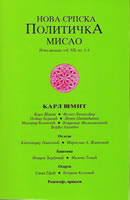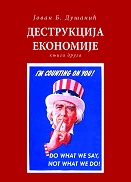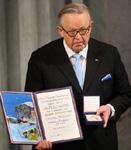| NSPM in English | |||
Ahtisaari’s Nobel scandal |
 |
 |
 |
| петак, 12. децембар 2008. | |
|
I consider his work as “peace mediator” – a term used repeatedly – in Kosovo incompatible with peace and with Alfred Nobel’s three criteria, but I deliberately did not mention his work in Aceh or Namibia of which I have no knowledge myself. Kosovo and other parts of former Yugoslavia have been something I have tried to understand since my first visit there 34 years ago. Independent Kosovo is the result of a military-based conflict management or, rather, mismanagement. It militates against two of Nobel’s criteria in that it has not lead to fraternity between peoples and it has not reduced armaments in the world. Kosovo declared itself independent in February this year (probably one reason why Ahtisaari received it this year) and is the result of the Kosovo Liberation Army, KLA, on the one hand and NATO’s 78 days of merciless bombings in 1999. That bombing – indisputably 100% on the side of the Albanian hardliners - is the main reason why Kosovo’s independence is supported by the US and a number EU countries. And with a new army in Kosovo there will be more rather than less armies and weapons in the world. Secondly, it can be argued – and I do - that the Nobel Committee has been established in a doubtful way in that it consists of Norwegian parliamentarians whereas Nobel in his will states that the Committee shall be appointed by the Norwegian Parliament but not necessarily be composed of parliamentarians. It ought not be possible that a prestigious peace prize can be decided by people who have no professional background or education and no particular competence in the field of peace. It would be inconceivable that a group of parliamentarians anywhere would been seen as an authority on, say, economics, literature or medicine. But when it comes to peace, it seems that anyone can be an expert! Peace belongs to a substantive academic field like the other Nobel prizes and ought not be decided by people who have no competence in peace, peace research and peace politics. Next – and much worse - Ahtisaari was involved in Kosovo not only by being involved in the issue of Kosovo’s future status. He was also instrumental in NATO’s ending its bombing in 1999. Which is good, isn’t it? Wait, it depends a little on how it was done. How it was done is described in an article by Gregory Elich, How the Nobel Peace Prize Was Won at CounterPunch on a meeting between Ahtisaari and Slobodan Milosevic in June 1999: “Ahtisaari opened the meeting by declaring, “We are not here to discuss or negotiate” … Milosevic took the papers and asked, “What will happen if I do not sign?” In answer, “Ahtisaari made a gesture on the table,” and then moved aside the flower centerpiece. Then Ahtisaari said, “Belgrade will be like this table. We will immediately begin carpet-bombing Belgrade.” Repeating the gesture of sweeping the table, Ahtisaari threatened, “This is what we will do to Belgrade.” A moment of silence passed, and then he added, “There will be half a million dead within a week.” So, the 2008 Nobel Peace Prize winner brought the message that those he represented were willing to flatten Belgrade and to kill 500 000 people in a week. Is this sort of ultimatum, the threat of mass-murder of innocent citizens, compatible with peace work? And does he regret anything about Kosovo? To the Guardian he states that Serbia shall not join the EU unless it accepts Kosovo as independent – a blackmail statement – and that the important thing is not that Kosovo has only been recognized by 51 countries out of 192. “What is important is that Kosovo has been recognized by over 65 per cent of the world’s wealth,” he maintains. The Nobel Laureate teaches us a brand new principle in international affairs here: wealth makes right! The amateur Nobel Committee implicitly gave its Prize this year to the opposite of Nobel’s will and vision as well as the opposite of the UN Charter norm of peace by peaceful means. It gave it to a man who worked for an extremely unjust far-too-late and non-mediated solution to the Kosovo conflict. Mr. Ahtisaari is a man of peace? Absolutely! In a world where peace is war and war is peace.
Jan Oberg is Director of the Transnational Foundation for Peace and Future Research (TFF) in Lund, Sweden.
(In Press No 5, Dec. 2008, Brussels)
|
Од истог аутора
Остали чланци у рубрици
- Playing With Fire in Ukraine
- Kosovo as a res extra commercium and the alchemy of colonization
- The Balkans XX years after NATO aggression: the case of the Republic of Srpska – past, present and future
- Из архиве - Remarks Before the Foreign Affairs Committee of the European Parliament
- Dysfunction in the Balkans - Can the Post-Yugoslav Settlement Survive?
- Serbia’s latest would-be savior is a modernizer, a strongman - or both
- Why the Ukraine Crisis Is the West’s Fault
- The Ghosts of World War I Circle over Ukraine
- Nato's action plan in Ukraine is right out of Dr Strangelove
- Why Yanukovych Said No to Europe

.jpg)








 I was among a handful of people worldwide who publicly criticized the Nobel Committee’s choice of former Finnish President Martti Ahtisaari as Nobel Peace Prize Laureate and characterized it as a scandal.
I was among a handful of people worldwide who publicly criticized the Nobel Committee’s choice of former Finnish President Martti Ahtisaari as Nobel Peace Prize Laureate and characterized it as a scandal.










